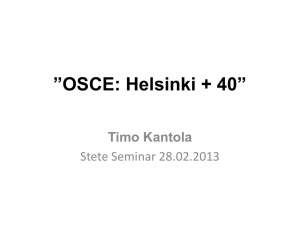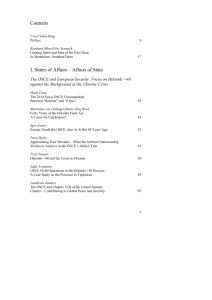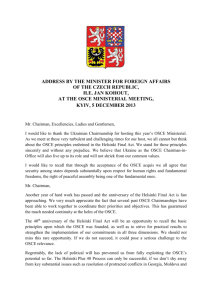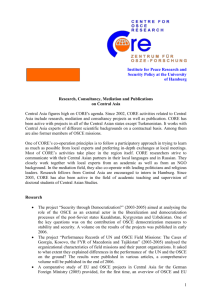Priorities for Action
advertisement
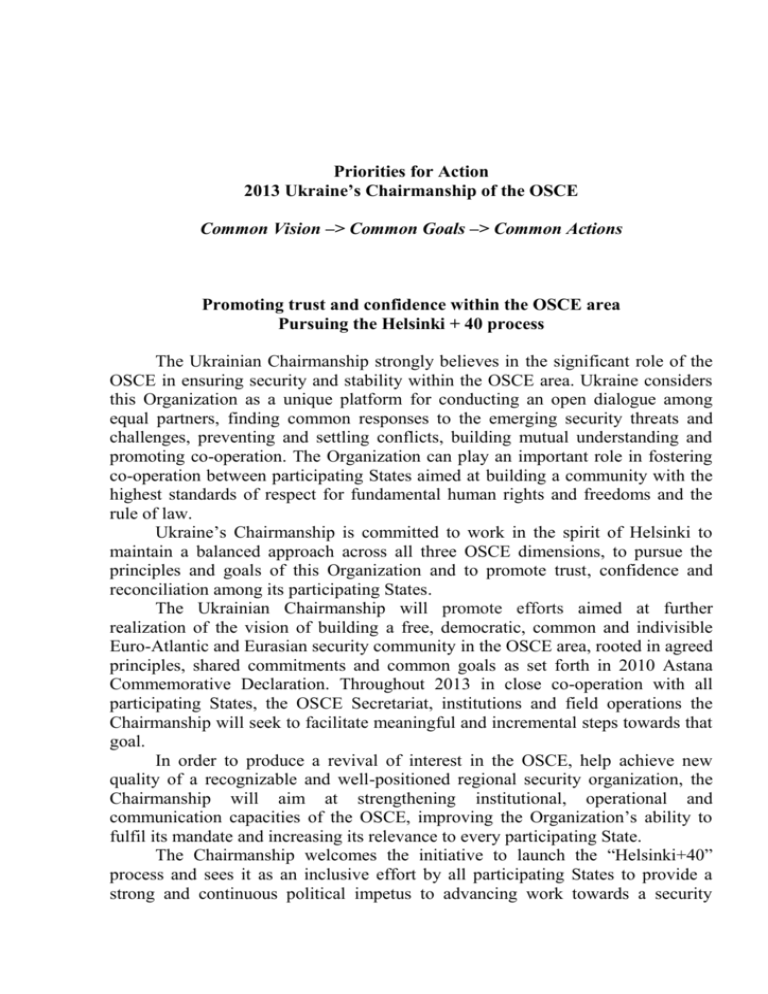
Priorities for Action 2013 Ukraine’s Chairmanship of the OSCE Common Vision –> Common Goals –> Common Actions Promoting trust and confidence within the OSCE area Pursuing the Helsinki + 40 process The Ukrainian Chairmanship strongly believes in the significant role of the OSCE in ensuring security and stability within the OSCE area. Ukraine considers this Organization as a unique platform for conducting an open dialogue among equal partners, finding common responses to the emerging security threats and challenges, preventing and settling conflicts, building mutual understanding and promoting co-operation. The Organization can play an important role in fostering co-operation between participating States aimed at building a community with the highest standards of respect for fundamental human rights and freedoms and the rule of law. Ukraine’s Chairmanship is committed to work in the spirit of Helsinki to maintain a balanced approach across all three OSCE dimensions, to pursue the principles and goals of this Organization and to promote trust, confidence and reconciliation among its participating States. The Ukrainian Chairmanship will promote efforts aimed at further realization of the vision of building a free, democratic, common and indivisible Euro-Atlantic and Eurasian security community in the OSCE area, rooted in agreed principles, shared commitments and common goals as set forth in 2010 Astana Commemorative Declaration. Throughout 2013 in close co-operation with all participating States, the OSCE Secretariat, institutions and field operations the Chairmanship will seek to facilitate meaningful and incremental steps towards that goal. In order to produce a revival of interest in the OSCE, help achieve new quality of a recognizable and well-positioned regional security organization, the Chairmanship will aim at strengthening institutional, operational and communication capacities of the OSCE, improving the Organization’s ability to fulfil its mandate and increasing its relevance to every participating State. The Chairmanship welcomes the initiative to launch the “Helsinki+40” process and sees it as an inclusive effort by all participating States to provide a strong and continuous political impetus to advancing work towards a security 2 community, and further strengthening co-operation in the OSCE on the way towards 2015. The Ukrainian Chairmanship will pursue this process on the basis of a co-ordinated strategic approach in co-operation with the upcoming OSCE Chairmanships by establishing an open-ended informal Helsinki+40 Working Group at the level of permanent representatives of participating States. To make this effort a success it is important for all participating States to engage constructively in a result-oriented process, thus helping to adjust the Organization’s role to the evolving conditions of the 21st century. We encourage joint ownership of and common responsibility for this initiative as well as readiness and resoluteness of all 57 participating States to embark on such an endeavour, which could be translated into practical deliverables as we approach the 40th anniversary of the Helsinki Final Act. Ensuring greater military stability, transparency and predictability The Astana Commemorative Declaration acknowledged that the conventional arms control and confidence and security building measures’ (CSBM) regimes remain major tools for ensuring military stability, predictability and transparency, and should be revitalized, updated and modernized. The importance of updating and modernizing the OSCE politico-military instruments was further stressed in relevant decisions of the Vilnius Ministerial Council. Arms control, disarmament and CSBMs are integral elements of the OSCE concept of comprehensive, co-operative, equal and indivisible security. To consolidate in practical terms this concept of security, a substantial progress in arms control and CSBMs is required to overcome the legacy of the bloc to bloc confrontation from the “cold war” era and to prevent emergence of new dividing lines. In this context the Chairmanship will work closely with the chairs of the Forum for Security Co-operation to facilitate discussion within the existing FSC mechanisms on the role conventional arms control can play in today’s and future European security architecture, taking into account current politico-military realities as well as risks and challenges to military security in Europe. The Ukrainian Chairmanship will be ready to contribute to “building bridges” between existing approaches on how to continue the update of the Vienna Document 2011 on Confidence and Security Building Measures, which would include the CSBMs covering new aspects of modern military activities. Against the background of new developments, trends and challenges in the field of nuclear non-proliferation, prohibition of chemical and biological weapons, prevention of the spread of missiles and missiles technologies, as well as in the area of export controls, the Chairmanship stresses the importance of completing the update of 1994 OSCE Principles Governing Non-proliferation to bring it in line with current politico-military realities. Reaching a consensus on these issues will make a substantial contribution to multilateral non-proliferation regimes and encourage further international cooperation in the area of non-proliferation. 3 Facilitating resolution of protracted conflicts The Ukrainian Chairmanship is determined to address protracted conflicts in the OSCE area as a matter of priority, seeking to achieve progress in their resolution in a peaceful and negotiated manner, within agreed formats, fully respecting the UN Charter, the Helsinki Final Act and relevant principles of international law. The Special Representative of the Chairman-in-Office on conflicts will work in close co-ordination with participating States and the OSCE structures to contribute to progress in the settlement of protracted conflicts. The Ukrainian Chairmanship will focus on re-energizing existing negotiating formats and making use of other possibilities that are acceptable to all parties concerned, promote confidence-building measures and address humanitarian needs on the ground. Welcoming the resumption of the formal negotiations in the 5+2 format in 2011, the Chairmanship will build on the progress achieved by Chisinau and Tiraspol in resolving pressing issues of economic and humanitarian co-operation. The Chairmanship believes that maintaining the positive dynamics of the talks along with the promotion of contacts between the parties at all levels is of utmost importance for achieving a comprehensive political solution. To that end, in the course of 2013 the Chairmanship will organize a number of meetings in the 5+2 format, as well as promote other measures conducive to conflict resolution. The first visit of the Chairman-in-Office to the area will take place in January 2013, which testifies to the special attention of the Ukrainian Chairmanship to maintaining an active and dynamic engagement with parties on the ground. The Chairmanship hopes that good will and constructive approach of the parties will produce concrete results in solving specific problems that hamper progress in finding political solution of the Transdniestrian conflict. Supporting the work within the framework of the Geneva Discussions, aimed at further building trust and confidence between the parties and solving pressing issues to improve the security and humanitarian situation on the ground, will remain an equally important task for the Ukrainian Chairmanship. The Chairmanship is also determined to support the efforts of the OSCE Minsk Group in assisting the parties to find a peaceful solution to the NagornoKarabakh conflict. The Chairmanship will contribute to the implementation of the Vilnius Ministerial Council Decision on the Conflict Cycle with particular emphasis on early warning and early action. In close co-operation with the OSCE Secretariat the Chairmanship will promote discussions on enhancing capacities for preventing emergence of new conflicts and any escalation of violence in the OSCE area. Taking note of the relevant ideas of participating States and the Secretariat and recognizing the practical value of the informal discussions held in 2012, the Ukrainian Chairmanship will further promote strengthening the OSCE’s capacity and effectiveness in all phases of the conflict cycle. 4 Addressing common threats to security Against the backdrop of new political and economic challenges, it is crucial for the OSCE participating States to demonstrate unity of purpose and action for effectively countering transnational threats such as terrorism, trafficking in drugs and human beings, cyber and border related crimes. The Ukrainian Chairmanship will promote practical implementation of the Dublin Ministerial Council Decision on the OSCE’s Efforts to Address Transnational Threats with the aim of translating political commitments into programmatic actions. To this end the Chairmanship will advocate step-by-step approach to the implementation of the OSCE Strategic Framework for Police-Related Activities, the OSCE Concept for Combating the Threat of Illicit Drugs and the Diversion of Chemical Precursors as well as the OSCE Consolidated Framework for the Fight against Terrorism. The Chairmanship will seek support and co-operation of the participating States in organizing thematic events on fighting against terrorism, countering illicit drugs, and practical implementation of the OSCE Strategic Framework for PoliceRelated Activities. The Chairmanship will provide necessary support to the activities of the Informal Working Group established by the Permanent Council Decision 1039 and will work together with its Chair and all participating States to achieve progress on the set of Draft Confidence Building Measures (CBMs) to Reduce the Risks of Conflicts Stemming from the Use of Information and Communication Technologies (ICTs). The year 2014 will bring about the withdrawal of the International Security Assistance Forces from Afghanistan. In this regard, it is important to develop and operationalise possible OSCE response to new challenges and threats that have a direct impact on the OSCE states bordering Afghanistan as well as on the whole OSCE area. To make a detailed analysis of potential risks to security of the OSCE participating States the Ukrainian Chairmanship sees merit in conducting in-depth discussions of this important issue within the OSCE framework. In connection with these activities the Ukrainian Chairmanship proposes to devote a specific session of the 2013 Annual Security Review Conference to the border-related issues. This work may form a basis for developing an update to the OSCE 2005 Border Security and Management Concept which defines the framework for cooperation among the OSCE participating States. The Ukrainian Chairmanship supports continued efforts on strengthening equal participation and full involvement of women in the maintenance and promotion of peace and security, in line with the UN Security Council Resolution 1325 (2000). 5 Increasing the relevance of the Economic and Environmental Dimension The Ukrainian Chairmanship sees the economic and environmental dimension as an integral component of the OSCE concept of comprehensive, cooperative, equal and indivisible security. Lasting peace, security and stability in the OSCE area cannot be attained without properly addressing existing and potential economic and environmental challenges and threats. The Chairmanship will strive to improve the effectiveness of the OSCE economic and environmental activities, in particular through the development of institutionally strong second dimension of the OSCE furnished with effective instruments capable of providing participating States with necessary assistance and expertise. The Ukrainian Chairmanship will build upon the ongoing discussions on prospects of adaptation of 2003 Maastricht Strategy Document for the Economic and Environmental dimension to the evolving economic and environmental situation. The 21st Economic and Environmental Forum (11-13 September 2013, Prague) will feature prominently within the OSCE second dimension. The theme of the Forum “Increasing stability and security: Improving the environmental footprint of energy related activities in the OSCE region” is expected to increase the focus on this topical issue. The two preparatory conferences will take place in Vienna (4-5 February 2013) and in Kyiv (16-17 April 2013). The Chairmanship will encourage the OSCE participating States to consider ways of increasing the OSCE’s role in the development of existing and establishment of new trade and transport corridors. Strengthening implementation of the Human Dimension commitments Through many years the OSCE has elaborated an extensive acquis in the Human Dimension aimed at enhancing protection of human rights and fundamental freedoms. Promotion of full implementation by all participating States of the undertaken commitments in the Human Dimension will be at the top of the Ukrainian Chairmanship’s agenda. The Chairmanship will endeavor to provide for necessary continuity in the Human Dimension and build upon the solid work already accomplished by previous Chairmanships with the hope that, on this basis, a more tangible progress could be achieved in 2013. In 2011 Vilnius Ministerial Declaration on combating all forms of human trafficking the participating States expressed grave concern that despite sustained measures undertaken at the international, regional, and national levels, trafficking remains a serious problem. The Ukrainian Chairmanship will promote fight against human trafficking with the aim to address all forms of this heinous crime in the OSCE area that violates human dignity and undermines human rights and fundamental freedoms. Particular focus will be placed on such forms as trafficking for the purposes of sexual exploitation, forced labour as well as support for victims 6 of human traffickers. The Ukrainian Chairmanship will organize an international conference on the issue of combating trafficking in human beings. The important role of the free media in ensuring free and fair elections and the rule of law is recognized by all participating States as expressed in the Astana Commemorative Declaration. The Chairmanship plans to hold an expert seminar on the issue of necessary legislation for the media freedom, which could result in developing relevant recommendations for participating States. Promotion of tolerance and non-discrimination through human rights education for youth belongs to priority areas of the Ukrainian Chairmanship. In this context the Chairmanship will propose to dedicate one of the OSCE events to the issue of youth human rights education on the principles of tolerance and nondiscrimination. The Ukrainian Chairmanship will also pay special attention to such themes of the Human Dimension agenda, as freedom of association and assembly, protection of the rights of persons belonging to national minorities, effective remedy for human rights violations, freedom of movement, access to quality education for Roma and Sinti, gender equality, inter-religious dialogue in promoting freedom of religion or belief, democratic elections and election observation. The Chairmanship will also support constructive engagement of civil society in achieving the goals and objectives of the OSCE. Attaching great importance to raising awareness of the OSCE activities among the younger generations, the Ukrainian Chairmanship is preparing to host an international event aimed at engaging youth representatives from all OSCE participating States and partners for co-operation. Enhancing result-oriented co-operation with Partners In close co-operation with the Chairs of the Asian and Mediterranean Contact Groups and building on the relevant decisions of the Vilnius Ministerial Council as well as on the achievements reached during 2012 in their implementation the Ukrainian Chairmanship will further explore the ways for a mutually beneficial co-operation between the OSCE and its Asian and Mediterranean partners. The Chairmanship will promote an open and constructive dialogue with OSCE partners for co-operation which will allow the participating States and partners to have frank and informative discussions on the many issues that affect security in our regions, many of which have a global impact on security, including in the course of 2013 OSCE Asian and Mediterranean partners for co-operation conferences. The Chairmanship will actively support further implementation of projects and programs of co-operation between the OSCE and Afghanistan in line with the Vilnius Ministerial Council Decision on Strengthening OSCE engagement with Afghanistan in the context of international efforts towards stabilization of the situation in this country. 7 Reinforcing OSCE’s Effectiveness and Efficiency The Chairmanship, in co-ordination with the OSCE Secretary General, will promote efforts to further improve the programme and budget planning process within the Organization. The Ukrainian Chairmanship will seek to further improve the programme evaluation and benchmarking efforts within the OSCE, which is of particular importance in times of severe financial constraints. Therefore, the Chairmanship will continue to build on the progress in the field of Budget Cycle Reform. Continuous efforts aimed at strengthening the link between performance evaluation, programme reporting and planning should be pursued, with a view to minimize repetitiveness, to optimize time spent on preparation and discussion of the budget documents, while strengthening multi-year strategic planning. The Chairmanship will establish an open-ended, informal OSCE working group on Scales of Contributions with the aim to streamline deliberations on reaching consensus on adoption of a revised Scales of Contributions and their periodic revision mechanisms. The Chairmanship will undertake further efforts in order to achieve an agreement on amending the OSCE Financial Regulations to strengthen the effectiveness and transparency of the OSCE. The Ukrainian Chairmanship will further promote a dialogue on strengthening the OSCE legal framework. The Ukrainian Chairmanship stresses the importance of the work carried out by the OSCE Secretariat, institutions and field operations in accordance with their respective mandates. The Chairmanship will continue to consistently support the mandate and activities of the three OSCE autonomous institutions – the High Commissioner on National Minorities, the Office for Democratic Institutions and Human Rights, and the Representative on Freedom of the Media. The Ukrainian Chairmanship will continue productive co-operation with the OSCE Parliamentary Assembly in addressing pertinent challenges facing participating States. Moving ahead towards a security community would require the OSCE’s positive involvement and co-operation with other international organizations. In the current state of play, while seeking to determine the best mode of engagement and to pave the way for more specific networking and cooperative efforts between the OSCE and other international organizations, we will focus our attention on the Organization’s identity, which is considered by the Chairmanship as its comparative advantage. The Ukrainian Chairmanship will promote enhancing the effectiveness of the OSCE co-operation with the other international, regional and sub-regional organizations operating in the OSCE area through regular exchanges of information, joint activities and thematic meetings.
